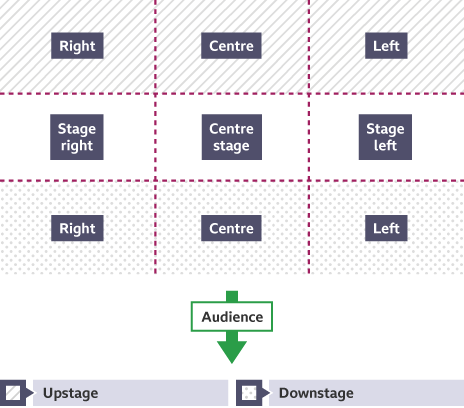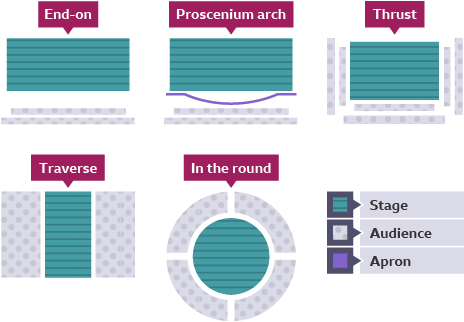Drama AQA GCSE theatre roles, staging and lighting
1/36
There's no tags or description
Looks like no tags are added yet.
Name | Mastery | Learn | Test | Matching | Spaced |
|---|
No study sessions yet.
37 Terms
director
responsible for the overall creative vision of the show
lead rehearsals
interprets the script
direct the performers and help them develop their characters
playwright
writes the script/performance text
sometimes are commissioned by theatre companies or producers
write the play in advance to rehearsals
present during rehearsal process
work with the director to develop ideas, making notes and writing the script organically
understudy
a performer who learns the lines and blocking of a regular performer in a production
if the regular performer is ever unable to perform, the understudy can cover their part
sometimes a smaller role while covering one of the lead roles
when an understudy goes on to perform a lead role, a performer called a swing will cover the understudy’s part
stage manager
responsible for backstage during production
usually lead a stage management team of deputy stage manager, assistant stage managers and a company stage manager
they are involved from before the first rehearsal until after the show is finished
they organise the rehearsal schedule and sit in the rehearsal room making notes that need to be passed onto the design team
they are responsible for organisational aspects, such as setting props and calling the show during the run of a show
performers
an actor, singer or dance who perform in a production
they usually audition in front of the director and a casting director for their part
they begin their work in the rehearsal room with the director, before performing on stage in front of an audience
they must maintain a high-quality performance during the run of the show nights
technician
there are multiple different types of technicians involved in theatre
may be involved in setting up the lighting, sound equipment and set
they may also operate technical equipment during a show, controlling lighting, sound or other aspects of the set
theatre manager
repsonsible for front of the house team
usually a permanent employee of a theatre building
they ensure a smooth running performance by looking after the audience
front of the house manager
supervises audience services like tickets, seating and refreshments
producer
oversees the business, legal, and financial side of the production
marketing manager
promotes the show and engages with the audience
deputy stage manager
usually calls the cues during performances
assistant stage manager
assists with props, set changes and backstage needs
set builder
constructs the set according to design specifications
prop maker
makes or sources props
wardrobe supervisor
oversees costume maintenance
choreographer
designs and arranges movement and dance
puppet designer
designs and arranges movement and dance
designers
often brought together by the director of a production
work together closely to help deliver the director’s artistic vision
some of their work may be done in advance of rehearsals, but they will often continue to work on a show until it opens
set designer
responsible for designing the se
works closely with the director and the design team to create the world of the show
they may begin by providing the director with a concept before moving onto the technical drawing stage
once the design us complete, the set is constructed and completed by various departments that specialise in materials such as metals, wood and paint.
costume designer
responsible for designing the costume, hair and makeup for a production
they work closely with design team to ensure the costumes match style of the show
they often create designs ahead of the production being cast and then make changes once met the performers
works closely with the costume department who are responsible for making the outfits and wigs
lighting designer
responsible for designing the lighting within a production
works closely with the director & design team to create lighting states for atmosphere and mood on stage
initially has an idea about the lighting, and then will make adjustments during the rehearsal process
once their design work is complete, technicians will set up and programme the lights
puppet designer
designing puppets within a production
ensure that puppets match the set and costume design, and the general aesthetic of the show
must ensure the puppets work efficiently when operated
staging

what is the thing to remember about the staging?
the actor’s right = your stage left
staging types

Spotlight
A strong, focused beam of light.
Draws attention to a specific actor or object.
Used in monologues or to isolate key characters.
Floodlight
A broad, unfocused light source.
Covers large areas; no sharp edge.
Used for general stage lighting.
Fresnel
A soft-edged spotlight with adjustable beam.
Creates gentle washes of light.
Used for background or atmospheric lighting.
Profile Spot
A hard-edged, focused spotlight.
Lights specific areas with precision.
Often used with gobos or gels.
Parcan
Intense, narrow beam of light.
Little control over focus; harsh effect.
Used in concerts or strong mood lighting.
Gel
A coloured plastic filter placed in front of lights.
Changes the colour to reflect mood or time.
Blue = sadness/night, Red = anger, etc.
Gobo
A stencil placed inside a lantern.
Projects patterns (e.g. windows, trees).
Used to create setting or atmosphere.
LED Lights
Digital lights that change colour and brightness.
Energy efficient; smooth transitions.
Used for modern effects or mood shifts.
Follow Spot
A movable spotlight controlled by a technician.
Keeps a performer lit while they move.
Used for solos or main characters.
Backlighting
Light from behind the subject.
Creates silhouettes or depth.
Used for drama, mystery, or symbolism.
Side Lighting
Lighting from the sides of the stage.
Highlights shape and movement.
Common in dance or physical theatre.
Uplighting / Underlighting
Light from below the actor or object.
Distorts the face for a spooky or dramatic effect.
Used in horror or symbolic scenes.